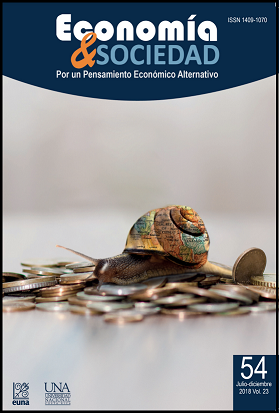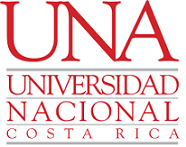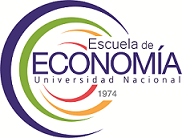Aid for trade and least-developed countries’ relationship with international competitiveness
DOI:
https://doi.org/10.15359/eys.23-54.1Keywords:
Aid for Trade, international competitiveness, WTO, least-developed countriesAbstract
The World Trade Organization’s (WTO) non-reimbursable cooperation program aims to provide aid for trade to least-developed countries (LDCs). These countries are characterized by having a low Human Development Index (HDI) and major problems in core strategic areas such as infrastructure, procedures, institutions, and supportive trade policies. The program’s objective is to develop trade capacity to enhance LDCs’ international competitiveness.
The study aims to establish the relationship between Aid for Trade and its effect on the international competitiveness of the 36 WTO least-developed member countries. To draw this relationship, an international competitiveness index was developed, including variables such as domestic competitiveness, human development, exportation performance, and trade openness.
The article concluded that there is a weak relationship between Aid for Trade and its effect on LDCs’ international competitiveness, which could improve if LDCs invest in electricity provisions together with port and airport infrastructure.
References
Banco Mundial. (s.f.). Observatorio de Competitividad. Recuperado de http://www.competitividad.org.do/posicionamiento/banco-mundial/
Banco Mundial. (2016). Alemania lidera el índice de desempeño logístico 2016. Recuperado de http://www.bancomundial.org/es/news/press-release/2016/06/28/germany-tops-2016-logistics-performance-index
Barbé, E. (2007). Relaciones Internacionales. Tercera edición. Madrid: Tecnos.
Castellanos, C., Castellanos, J., Machado, N., Vila, Z. y Barbosa, G. (2012). Contribución de los clusters a la competitividad de las empresas. Revista Técnica Administrativa, 50(11), 1-30. Recuperado de http://www.cyta.com.ar/ta1102/v11n2a2.htm
Central Intelligence Agency (2014a). The World Factbook. Exports. Recuperado de https://www.cia.gov/library/publications/the-world-factbook/fields/2078.html#bn
Central Intelligence Agency (2014b). The World Factbook. Imports. Recuperado de https://www.cia.gov/library/publications/the-world-factbook/fields/2087.html#bn
Central Intelligence Agency (2014c). The World Factbook. Gross Domestic Product. Recuperado de https://www.cia.gov/library/publications/the-world-factbook/fields/2195.html#bn
Conferencia de las Naciones Unidas para el Comercio y Desarrollo (2015) ¿Cuáles son los países menos adelantados? Recuperado de http://unctad.org/es/Paginas/PressRelease.aspx?OriginalVersionID=277
Fernández, P & Díaz, P. (2001). Relación entre variables cuantitativas. Unidad de Unidad de Epidemiología Clínica y Bioestadística, (4), 141-144. Recuperado de https://www.fisterra.com/mbe/investiga/var_cuantitativas/var_cuantitativas2.pdf
Fonseca, R. (2012). Índice de Competitividad Territorial aplicado a los cantones de Heredia. Economía y Sociedad, 42(17), 75-98. Recuperado de http://www.revistas.una.ac.cr/index.php/economia/article/view/5119
Goldstein, J; Kahler, M; Keohane, R & Slaghter, A. (2000). International Organization. Legalization and World Politics. 54(3): Introduction: Legalization and World Politics. 385-399.
IMD World Competitiveness Center (2014). IMD World Competitiveness Yearbook. Recuperado de http://www.colombiacompetitiva.gov.co/prensa/informes/IMD_WCY-2014.pdf
Keohane, R., & Nye, J. (1988). Poder e Interdependencia. La política mundial en transición. Buenos Aires, Argentina: Grupo Editor Latinoamericano. Recuperado de https://books.google.co.cr/books/about/Poder_e_interdependencia.html?id=LAJ1AAAACAAJ&redir_esc=y
Krasner, S. (1983). Structural causes and regimes consequences: regimes as intervening variables. International Regimes: Spring, 1982, 2(36), 185-205. Recuperado de https://www.jstor.org/stable/2706520?seq=1#page_scan_tab_contents
López, K. (2017). La OMC como régimen internacional de cooperación en materia de Ayuda al Comercio en los países menos adelantados: Caso Haití. (Tesis inédita de maestría). Universidad Nacional de Costa Rica, Heredia.
Organización para la Cooperación y el Desarrollo & World Trade Organization (2015). Reducing trade coste for inclusive, sustainable growth. Recuperado de https://www.wto.org/english/res_e/booksp_e/aid4trade15_e.pdf
Organización Mundial del Comercio. (s.f., a). ¿Qué es la OMC? Recuperado de https://www.wto.org/spanish/thewto_s/whatis_s/tif_s/fact1_s.htm
Organización Mundial del Comercio. (s. f., b). Declaración Ministerial. Recuperado de https://www.wto.org/spanish/thewto_s/minist_s/min05_s/final_text_s.htm
Organización Mundial del Comercio (2007). Programa de trabajo de la OMC sobre la ayuda para el comercio. Recuperado de https://www.wto.org/spanish/tratop_s/devel_s/a4t_s/global_review07_s.htm
Organización Mundial del Comercio (2016). Programa de Trabajo sobre Ayuda al Comercio. Recuperado de https://www.wto.org/spanish/tratop_s/devel_s/a4t_s/aid4trade_s.htm
Porter, M. (2007). La ventaja competitiva de las naciones. Harvard business review, 11(85), 69-95. Recuperado de https://dialnet.unirioja.es/servlet/articulo?codigo=2469800
World Economic Forum (s.f). Competitiveness Rankings. Recuperado de http://reports.weforum.org/global-competitiveness-report-2015-2016/competitiveness-rankings/
World Trade Organization (2006). Recommendations of the Task force on Aid for Trade. Recuperado de https://www.odi.org/publications/4053-aid-trade
Downloads
Published
How to Cite
Issue
Section
License
This publication is subject to the Creative Commons License; therefore, its attributions and restrictions must be respected.
Authors publishing in this Journal accept the following conditions:
- Authors retain copyright ownership and give the Journal first publication right of the paper, which is registered with the Creative Commons Attribution-NonCommercial-ShareAlike 4.0 International License. This license allows third parties to use the published work provided it is sourced as firstly published in this Journal.
- Authors may enter into other independent and additional contractual agreements for the non-exclusive distribution of the article published in this Journal (e.g., to be included in an institutional repository or published in a book) provided it is clearly stated that the work was published in this Journal for the first time.
- Authors are allowed and recommended to publish their work on the Internet (for example, on institutional or personal pages) before and during the review and publication process, as it can lead to productive exchanges and a greater and faster dissemination of work published.

The Economía & Sociedad Journal, published by Universidad Nacional, is licensed under a Creative Commons Reconocimiento-NoComercial-CompartirIgual 4.0 Internacional License. Based on http://www.revistas.una.ac.cr/index.php/economia.








